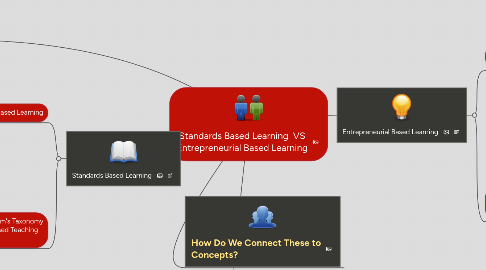
1. National Education Association
1.1. "We believe that this initiative is a critical first step in our nation's effort to provide every student with a comprehensive, content-rich and complete education these standards have the potential to support teachers in achieving NEA's purpose of preparing students to thrive in a democratic society and a diverse, changing world as knowledgeable, creative, and engaged citizens and lifelong learners." (CCSSI, 2012) -Lily Eskelsen, Vice-President, NEA
2. Teachers
3. Standards Based Learning
3.1. Believers in Standards Based Learning
3.1.1. Bill Gates
3.1.1.1. "With the states' release today of a set of clear and consistent academic standards, our nation is one step closer to supporting effective teaching in every classroom, charting a path to college and careers for all students, and developing the tools to help all children stay motivated and engaged in their own education." (CCSSI, 2012)
3.1.2. American Federation of Teachers
3.1.2.1. "If we use these common standards as the foundation for better schools, we can give all kids a robust curriculum taught by well-prepared, well-supported teachers who can help prepare them for success in college, life, and careers." (CCSSI, 2012) -Randi Weingarten, President, American Federation of Teachers
3.2. Levels of Bloom's Taxonomy Standards Based Teaching uses...
3.2.1. Knowledge
3.2.1.1. Remember previously learned information. (Clemson, 2009)
3.2.2. Comprehension
3.2.2.1. Demonstrate an understanding of the facts. (Clemson, 2009)
3.2.3. Application
3.2.3.1. Apply knowledge to actual situations. (Clemson, 2009)
4. How Do We Connect These to Concepts?
5. Entrepreneurial Based Learning
5.1. Believers in an Entrepreneurial Based Learning Environment
5.1.1. Yong Zhao
5.1.1.1. "Entrepreneurship is fundamentally about the desire to solve problems creatively. The foundation of entrepreneurship-creativity, curiosity, imagination, risk taking, and collaboration- is in our bones and part of our human nature and experience." (Zhao, 2012, pg. 9)
5.1.2. Sir Ken Robinsion
5.1.2.1. “So many people have degrees now that an individual degree isn’t worth a fraction of what it used to be worth. So being creative is essential to us; it’s essential for our economy.” (Azzam, 2009)
5.1.3. Daniel Pink
5.1.3.1. “Machines have replaced our bodies in certain kinds of jobs, software is replacing our left brains by doing sequential, logical work. So in order to make it today, you have to do work that’s hard to outsource, hard to automate.” (Winfrey, 2009)
5.2. Levels of Bloom's Taxonomy Entrepreneurial Teaching uses...
5.2.1. Analysis
5.2.1.1. Break down objects or ideas into simpler parts and find evidence to support generalizations. (Clemson, 2009)
5.2.2. Evaluation
5.2.2.1. Make and defend judgments based on internal evidence or external criteria. (Clemson, 2009)
5.2.3. Synthesis
5.2.3.1. Make and defend judgments based on internal evidence or external criteria. (Clemson, 2009)
